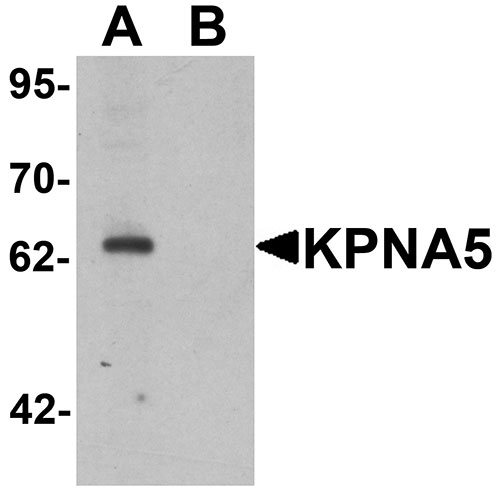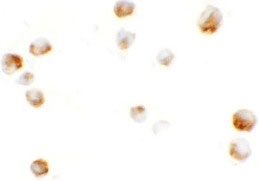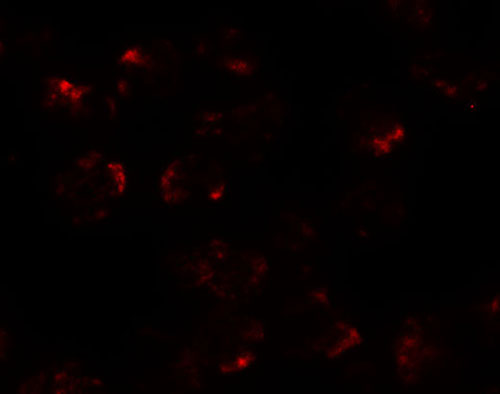KPNA5 Antibody
- SPECIFICATION
- CITATIONS
- PROTOCOLS
- BACKGROUND

Application
| WB, IF, ICC, E |
|---|---|
| Primary Accession | O15131 |
| Other Accession | CAH71948, 55664992 |
| Reactivity | Human, Mouse |
| Host | Rabbit |
| Clonality | Polyclonal |
| Isotype | IgG |
| Calculated MW | 60666 Da |
| Application Notes | KPNA5 antibody can be used for detection of EPAC1 by Western blot at 1 µg/mL. Antibody can also be used for immunocytochemistry starting at 5 µg/mL. For immunofluorescence start at 5 µg/mL. |
| Gene ID | 3841 |
|---|---|
| Target/Specificity | KPNA5; KPNA5 antibody is predicted to not cross-react with other Importin alpha family members. |
| Reconstitution & Storage | KPNA5 antibody can be stored at 4℃ for three months and -20℃, stable for up to one year. As with all antibodies care should be taken to avoid repeated freeze thaw cycles. Antibodies should not be exposed to prolonged high temperatures. |
| Precautions | KPNA5 Antibody is for research use only and not for use in diagnostic or therapeutic procedures. |
| Name | KPNA5 (HGNC:6398) |
|---|---|
| Function | Functions in nuclear protein import as an adapter protein for nuclear receptor KPNB1. Binds specifically and directly to substrates containing either a simple or bipartite NLS motif. Docking of the importin/substrate complex to the nuclear pore complex (NPC) is mediated by KPNB1 through binding to nucleoporin FxFG repeats and the complex is subsequently translocated through the pore by an energy requiring, Ran-dependent mechanism. At the nucleoplasmic side of the NPC, Ran binds to importin-beta and the three components separate and importin-alpha and -beta are re-exported from the nucleus to the cytoplasm where GTP hydrolysis releases Ran from importin. The directionality of nuclear import is thought to be conferred by an asymmetric distribution of the GTP- and GDP-bound forms of Ran between the cytoplasm and nucleus. Mediates nuclear import of STAT1 homodimers and STAT1/STAT2 heterodimers by recognizing non-classical NLSs of STAT1 and STAT2 through ARM repeats 8-9. Recognizes influenza A virus nucleoprotein through ARM repeat 7-9 In vitro, mediates the nuclear import of human cytomegalovirus UL84 by recognizing a non-classical NLS. |
| Cellular Location | Cytoplasm. |
| Tissue Location | Testis. |

Thousands of laboratories across the world have published research that depended on the performance of antibodies from Abcepta to advance their research. Check out links to articles that cite our products in major peer-reviewed journals, organized by research category.
info@abcepta.com, and receive a free "I Love Antibodies" mug.
Provided below are standard protocols that you may find useful for product applications.
Background
KPNA5 Antibody: Karyopherin, a cytosolic and heterodimeric protein complex consisting of alpha and beta subunits, is responsible for targeting proteins with nuclear localization signals to the nuclear pore complex (NPC) by an energy requiring, Ran-dependent mechanism. The alpha subunit and imported substrate enter the nucleus and accumulate in the nucleoplasm, while the beta subunit accumulates at the NPC. KPNA5 belongs to a subfamily within the KPNA family that also includes KPNA4 and 6 and is thought to be involved in NLS-dependent protein imort into the nucleus.
References
Moroianu J. Molecular mechanisms of nuclear protein transport. Crit. Rev. Eukaryot. Gene. Expr. 1997; 7:61-72.
Gilchrist D and Rexach M. Molecular basis for the rapid dissociation of nuclear localization signals from karyopherin alpha in the nucleoplasm. J. Biol. Chem. 2003; 278: 51937-49
Kohler MC, Fiebeler M, Hartwig S, et al. Evidence for distinct substrate specificity of importin alpha family members in nuclear protein import. Mol. Cell. Biol. 1999; 19:7782-91.
If you have used an Abcepta product and would like to share how it has performed, please click on the "Submit Review" button and provide the requested information. Our staff will examine and post your review and contact you if needed.
If you have any additional inquiries please email technical services at tech@abcepta.com.













 Foundational characteristics of cancer include proliferation, angiogenesis, migration, evasion of apoptosis, and cellular immortality. Find key markers for these cellular processes and antibodies to detect them.
Foundational characteristics of cancer include proliferation, angiogenesis, migration, evasion of apoptosis, and cellular immortality. Find key markers for these cellular processes and antibodies to detect them. The SUMOplot™ Analysis Program predicts and scores sumoylation sites in your protein. SUMOylation is a post-translational modification involved in various cellular processes, such as nuclear-cytosolic transport, transcriptional regulation, apoptosis, protein stability, response to stress, and progression through the cell cycle.
The SUMOplot™ Analysis Program predicts and scores sumoylation sites in your protein. SUMOylation is a post-translational modification involved in various cellular processes, such as nuclear-cytosolic transport, transcriptional regulation, apoptosis, protein stability, response to stress, and progression through the cell cycle. The Autophagy Receptor Motif Plotter predicts and scores autophagy receptor binding sites in your protein. Identifying proteins connected to this pathway is critical to understanding the role of autophagy in physiological as well as pathological processes such as development, differentiation, neurodegenerative diseases, stress, infection, and cancer.
The Autophagy Receptor Motif Plotter predicts and scores autophagy receptor binding sites in your protein. Identifying proteins connected to this pathway is critical to understanding the role of autophagy in physiological as well as pathological processes such as development, differentiation, neurodegenerative diseases, stress, infection, and cancer.




